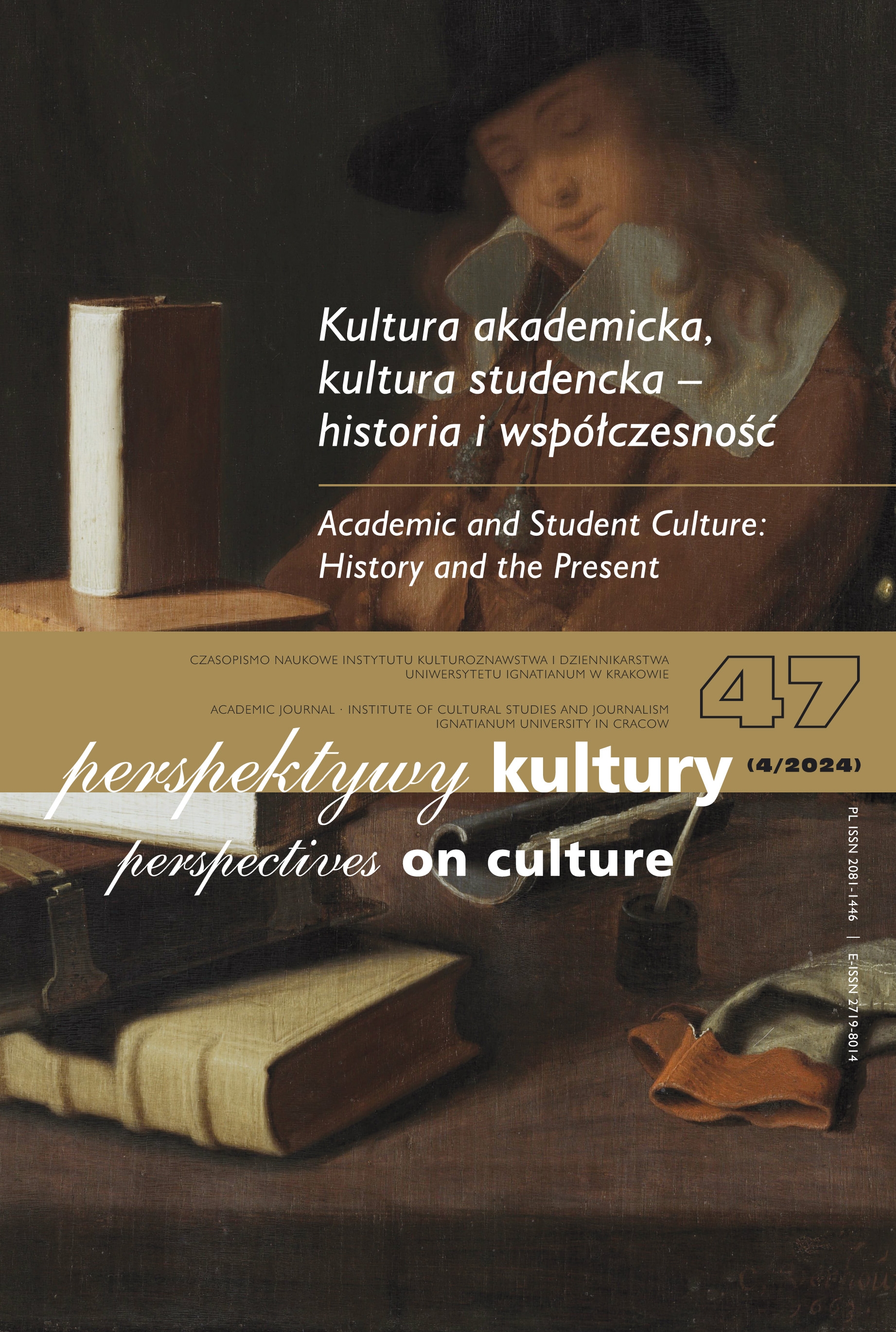Academic Culture, Student Culture and the Idea of the University
Abstract
The article examines the relationship between academic culture and student culture, analyzing their connection to the idea of the university. Adopting a phenomenological approach, it seeks to describe the essential features of these interrelated phenomena and the idea of the university. The study aims to outline the theoretical and axiological foundations of university life, where academic and student cultures coexist. One of the objectives is to determine which concept of culture encompasses all three elements mentioned in the title. The author indicates that this is the concept of culture encapsulated by the German term Bildung, which denotes the intellectual and moral shaping or formation of a human being, also captured by the Greek concept of paideia. Understanding culture as the shaping (Bildung or paideia) of an individual’s humanity unites the idea of the university, academic culture and student culture. These elements share a foundational relationship: the idea of the university constitutes the axiological basis for academic culture, which, in turn, forms the axiological foundation for student culture. This foundational relationship attests to their structural unity, reflected in shared values such as truth, good and beauty – intellectual, moral and aesthetic ideals. These values are manifested by individuals whose humanity is shaped (or educated) – which is the axiological essence of a human being – through participation in university life, where academic culture and student cultures are cultivated in accordance with their essential nature. This structural and axiological unity is described in the article.
References
Arendt, H. (1994). Między czasem minionym a przy¬szłym. Osiem ćwiczeń z myśli po¬litycznej. Warszawa: Aletheia.
Barnard, A. (2021). Antropologia. Zarys teorii i historii. Warszawa: Państwowy Instytut Wydawniczy.
Fontaine, P. (2007). La culture. Paris: Ellipses.
Gadacz, T. (2017). Karla Jaspersa idea uniwersytetu. Wstęp do wydania polskiego. W: Jaspers, K. (2017). Idea uniwersytetu. Warszawa: Narodowe Centrum Kultury, 11-27.
Gadamer, H.-G. (2007). Prawda i metoda. Zarys hermeneutyki filozoficznej. Warszawa: Wydawnictwo Naukowe PWN.
Gadamer, H.-G. (2008). Idea uniwersytetu – wczoraj, dziś, jutro. W: Gadamer, H.-G., Teoria, etyka, edukacja. Eseje wybrane. Warszawa: Wydawnictwa Uniwersytetu Warszawskiego, 240-257.
Ciborowska, A., Gąsowski, T., Piela L., Szlachta, B. (2011). Forum. Dostojeństwo uniwersytetu? Perspektywy Kultury, nr 4 (1/2011), 7-23.
Gizella, J. (2011) Niepokorni, kontrowersyjni, różnorodni. O kulturze studenckiej lat 1956-1981, Perspektywy Kultury, nr 4 (1/2011), 57-69.
Ingarden, R. (1987). Książeczka o człowieku. Kraków: Wydawnictwo Literackie.
Jaeger, W. (2001). Paideia. Formowanie człowieka greckiego. Warszawa: Fundacja Aletheia.
Jaspers, K. (2017). Idea uniwersytetu. Warszawa: Narodowe Centrum Kultury.
Kant, I. (2005). Metafizyka moralności. Warszawa: Wydawnictwo PWN.
Stróżewski, W. (2013). Logos, wartość, miłość. Kraków: Wydawnictwo Znak.
Szanduła, M. (2020). Kultura studencka na Uniwersytecie Rolniczym w Krakowie. Historia i współczesność. Kraków: Wydawnictwo Uniwersytetu Rolniczego w Krakowie.
Szanduła, M. (2023). Przestrzeń edukacyjno-kulturowa w szkole wyższej, W: Szanduła, M. (red.), Kultura studencka we wspomnieniach jej twórców (Wyższa Szkoła Rolnicza, Akademia Rolnicza, Uniwersytet Rolniczy w Krakowie). Kraków: Wydawnictwo Uniwersytetu Rolniczego w Krakowie, 9-27.
Tischner, J. (1982). Etyka wartości i nadziei. W: Hildebrand von, D., Kłoczowski, J. A., Paściak J., Tischner, J., Wobec wartości. Poznań: „W drodze”. Wydawnictwo Polskiej Prowincji Dominikanów, 51-148.
Copyright (c) 2024 Perspectives on Culture

This work is licensed under a Creative Commons Attribution-NoDerivatives 4.0 International License.
Autor, zgłaszając swój artykuł, wyraża zgodę na korzystanie przez Wydawnictwo Uniwersystet Ignatianum z utworu na następujących polach eksploatacji:
- utrwalania utworu w formie papierowej, a także na nośniku cyfrowym lub magnetycznym;
- zwielokrotnienia utworu dowolną techniką, bez ograniczenia ilości wydań i liczby egzemplarzy;
- rozpowszechniania utworu i jego zwielokrotnionych egzemplarzy na jakimkolwiek nośniku, w tym wprowadzenia do obrotu, sprzedaży, użyczenia, najmu;
- wprowadzenia utworu do pamięci komputera;
- rozpowszechniania utworu w sieciach informatycznych, w tym w sieci Internet;
- publicznego wykonania, wystawienia, wyświetlenia, odtworzenia oraz nadawania i reemitowania, a także publicznego udostępniania utworu w taki sposób, aby każdy mógł mieć do niego dostęp w miejscu i czasie przez siebie wybranym.
Wydawca zobowiązuje się szanować osobiste prawa autorskie do utworu.





